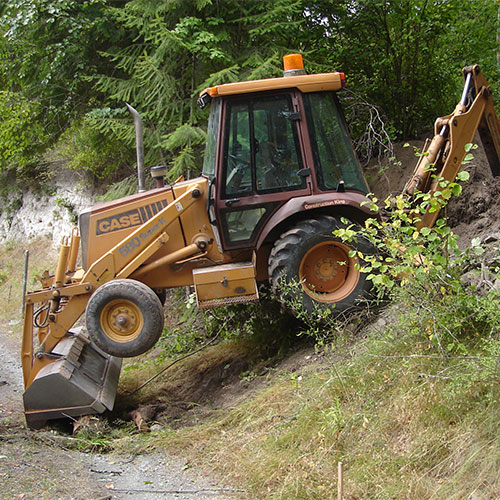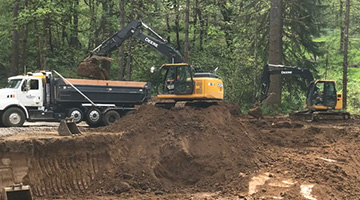Comprehensive Excavation Approaches: Mastering the Fundamentals for Success
In the world of building and construction and civil design, the relevance of reliable excavation approaches can not be overstated. The cautious preparation, accurate execution, and careful interest to detail required in excavation projects require a thorough strategy that encompasses numerous essential elements. From preliminary dirt analysis to the application of precaution and normal progression monitoring, grasping these core aspects is vital for accomplishing success in any excavation endeavor. The true proficiency lies not simply in understanding these principles however in perfectly incorporating them to navigate the complexities of excavation tasks with skill.
Recognizing Excavation Project Preparation

Effective excavation jobs are constructed on the foundation of thorough and meticulous preparation. The first phase of any kind of excavation job is the preparation phase, where essential choices are made that can significantly impact the end result of the project. Throughout this phase, it is vital to collect all appropriate details about the site, consisting of topographical studies, dirt structure, and any type of prospective risks that may exist. Understanding the task timeline, spending plan, and range constraints is essential for producing an extensive excavation strategy that makes sure the project's success.
One trick facet of excavation project planning is the advancement of a thorough timeline that lays out the series of target dates, turning points, and activities. This timeline works as a roadmap for the task group, allowing them to track development and make necessary adjustments to guarantee the task remains on schedule. Furthermore, a well-defined budget that makes up all expenses, consisting of tools rental, labor expenses, and materials, is necessary for avoiding cost overruns and delays. By meticulously considering all these aspects during the planning stage, excavation projects can be implemented successfully and efficiently, leading to effective results.
Soil Evaluation and Site Analysis
Carrying out thorough soil analysis and site evaluation is a critical action in the preparation phase of any type of excavation job. Soil evaluation involves figuring out the structure, framework, and residential or commercial properties of the soil at the excavation website. This information is important for recognizing the soil's bearing ability, wetness content, and capacity for erosion, which are crucial consider figuring out the excavation techniques and equipment needed for the project.
Website analysis exceeds soil evaluation and includes a broader analysis of the overall website problems. This examination consists of identifying any kind of possible hazards, such as below ground utilities, ecological problems, or unpredictable surface, that could impact the excavation procedure. By thoroughly examining the site, task supervisors can develop reliable excavation approaches that prioritize safety, effectiveness, and ecological defense.
Making use of innovative technologies like ground-penetrating radar, dirt sampling, and drone studies can boost the precision and efficiency of soil analysis and site examination. Spending time and resources in these preliminary actions can eventually save time and stop expensive hold-ups or complications throughout the excavation procedure.
Tools Choice and Application
Effective excavation jobs rely greatly on tactical tools option and application to guarantee optimum efficiency and productivity. Choosing the ideal equipment for the work is essential in making best use of performance and lessening downtime. Aspects such as resource the type of soil, depth of excavation, and job extent play a considerable role in identifying the most appropriate tools for the job at hand.

Along with selecting the ideal tools, correct usage is key to task success. Operators should be trained to take care of the equipment securely and effectively - excavating ohio. Routine maintenance checks and timely fixings aid prevent break downs and make certain consistent performance throughout the project
Precaution and Regulations Conformity
In the realm of excavation projects, focusing on security steps and conformity with laws is vital to making sure a legally audio and protected operational setting. Security procedures encompass a series of techniques, consisting of carrying out complete site analyses, applying appropriate signs and barriers, and giving appropriate security training for all personnel involved in the excavation process. Adherence to guidelines, such as OSHA requirements in the United States, ensures that the excavation job meets the essential requirements to shield workers, spectators, and the surrounding atmosphere.

Monitoring Progress and Adjusting Strategies
How can predict managers successfully track the improvement of excavation tasks and adapt their methods accordingly to maximize end results? Monitoring development is essential for making sure that excavation tasks stay on track and satisfy target dates.

Conclusion
Finally, mastering the principles site link of extensive excavation strategies is crucial for the success of any kind of task. By comprehending task planning, analyzing dirt and site conditions, choosing appropriate tools, following safety and security guidelines, and checking progress, task managers can make sure a smooth and efficient excavation process. Carrying out these strategies will bring about successful end results and decrease potential dangers or setbacks during the excavation project.
The preliminary phase of any type of excavation project is the planning stage, where crucial decisions are made that can substantially impact the result of the task. Understanding the job budget, range, and timeline restrictions is critical for creating a thorough excavation plan that makes certain the project's success.
Exactly how can predict supervisors effectively track the development of excavation jobs and adjust their techniques as necessary to optimize results? By very closely keeping track of progression and being ready to adapt approaches, project managers can improve the total success of excavation projects.
By comprehending project planning, assessing soil and site conditions, selecting appropriate equipment, complying with safety policies, and keeping track of development, job managers can ensure a smooth and effective excavation process.